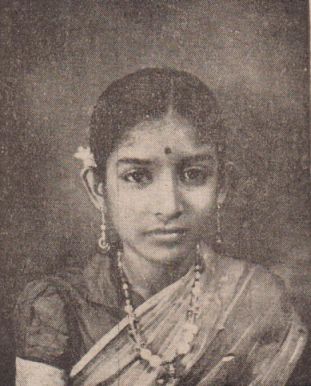
Pillavalu Gajapathy Krishnaveni, more famously known as Jikki, was an Indian playback singer from Andhra Pradesh. She sang around 10,000 songs in Telugu, Tamil, Kannada, Malayalam, Sinhalese, and Hindi languages.
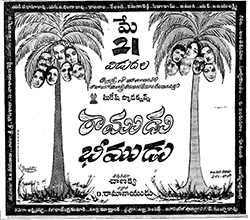
Ramudu Bheemudu is a 1964 Indian Telugu-language film directed by Tapi Chanakya. It was produced by D. Ramanaidu under the Suresh Productions banner. It stars N. T. Rama Rao, Jamuna and L. Vijayalakshmi, with music composed by Pendyala. The film was a major box office success.

Brahmachari (transl. Bachelor) is a 1968 Indian Telugu-language comedy drama film, produced by A. V. Subba Rao under the Prasad Art Productions banner and directed by T. Rama Rao. The film stars Akkineni Nageswara Rao and Jayalalithaa, with music composed by T. Chalapathi Rao. It was released on 1 February 1968. The film was remade in Hindi as Ek Nari Ek Brahmachari (1971). It was loosely based on the 1967 Tamil movie Penne Nee Vaazhga.

Manchi Kutumbam is a 1968 Indian Telugu-language drama film co-written and directed by V. Madhusudhana Rao. The film stars Akkineni Nageswara Rao, Sowcar Janaki, Kanchana, Krishna and Vijaya Nirmala, with music composed by S. P. Kodandapani. It is a remake of the Hindi film Grahasti (1963) itself based on the American film The Remarkable Mr. Pennypacker (1959). Grahasti was earlier remade into Tamil as Motor Sundaram Pillai (1966).

Akka Chellelu is a 1970 Indian Telugu-language drama film, produced by V. B. Rajendra Prasad and directed by A. Sanjeevi. It stars Akkineni Nageswara Rao, Sowcar Janaki, Krishna and Vijaya Nirmala, with music composed by K. V. Mahadevan. The film was a remake of the Tamil film Akka Thangai (1969).
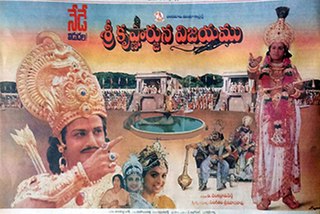
Sri Krishnarjuna Vijayam is a 1996 Indian Telugu-language Hindu mythological film, produced by B. Venkatarama Reddy under the Chandamama Vijaya Combines banner and directed by Singeetam Srinivasa Rao. It stars Nandamuri Balakrishna, Roja with music composed by Madhavapeddi Suresh. The film won four Nandi Awards.

Vichitra Kutumbam is a 1969 Indian Telugu-language comedy film, produced by V. K. P. Sunkavalli under the Sriraj Art Films banner and directed by K. S. Prakash Rao. It stars N. T. Rama Rao, Savitri, Krishna, Shobhan Babu and Vijaya Nirmala, with music composed by T. V. Raju. A remake of this film in Hindi with Dilip Kumar was shelved.
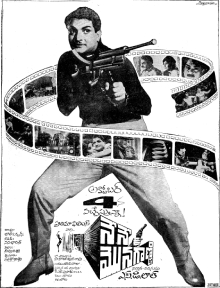
Nene Monaganni is a 1968 Telugu-language action crime film, produced and directed by S. D. Lal on Prathima Films banner. It stars N. T. Rama Rao, Sheela and the music is composed by T. V. Raju.

Manushullo Devudu is a 1974 Indian Telugu-language drama film, produced by A. Pundarikakshaiah under the Sri Bhaskara Chitra banner and directed by B. V. Prasad. It stars N. T. Rama Rao and Vanisri, with music composed by T. V. Raju as his last composition. He expired during the shoot and S. Hanumantha Rao completed the music. The film was remade in Hindi as Udhar Ka Sindur (1976).
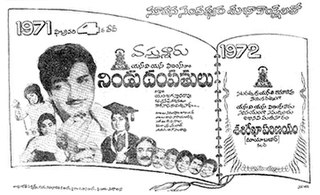
Nindu Dampathulu is a 1971 Indian Telugu-language drama film, produced by M. Jagannatha Rao under the S.V.S. Films banner and directed by K. Viswanath. It stars N. T. Rama Rao, Savitri, Vijaya Nirmala and music jointly composed by T. V. Raju & Vijaya Krishna Murthy. A few of the scenes in the film are replicated in Swayamkrushi (1987), which was also directed by K. Viswanath.

Rajakota Rahasyam is a 1971 Indian Telugu-language swashbuckler film directed by B. Vittalacharya. It stars N. T. Rama Rao, Devika with music composed by Vijaya Krishna Murthy. The film was produced by M. K. Gangaraju under the G. R. Productions banner.

Samsaram (transl. Family) is a 1975 Indian Telugu-language drama film, produced and directed by T. Prakash Rao under the Anil Productions banner. It stars N. T. Rama Rao and Jamuna. The music was composed by T. Chalapathi Rao.
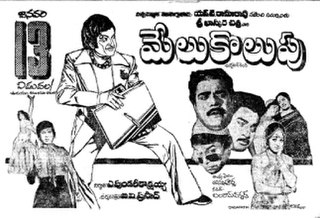
Melu Kolupu is a 1978 Telugu-language drama film, produced by A. Pundarikakshaiah under the Sri Bhaskara Chitra and directed by B. V. Prasad. It stars N. T. Rama Rao, Jaya Prada, K. R. Vijaya and music composed by Master Venu. The film is a remake of the Hindi movie Jagriti (1977).

Thalla? Pellama? is a 1970 Indian Telugu-language drama film directed by N. T. Rama Rao. It stars N. T. Rama Rao, Chandrakala and Master Harikrishna, with music composed by T. V. Raju. It is produced by N. Trivikrama Rao under the NAT and Ramakrishna Cine Studios banners. The film was remade in Hindi as Bidaai (1974) and in Tamil as Piriya Vidai (1975).

Stree Janma is a 1967 Telugu-language drama film, produced by D. Ramanaidu under the Suresh Productions banner and directed by K. S. Prakash Rao. It stars N. T. Rama Rao and Krishna Kumari, with music composed by Ghantasala.

Nindu Manasulu is a 1967 Indian Telugu-language drama film, produced by M. Jaganatha Rao under the banner S.V.S. Films and directed by S. D. Lal. The film stars N. T. Rama Rao and Devika, with music composed by T. V. Raju. It is a remake of the 1966 Hindi film Phool Aur Patthar.

Manchi Manishi is a 1964 Indian Telugu-language drama film, produced by K. Subba Raju under the Chaya Chitra banner and directed by K. Pratyagatma. It stars N. T. Rama Rao, Jamuna and Jaggayya, with music jointly composed by S. Rajeswara Rao and T. Chalapathi Rao.

Irugu Porugu (transl. Neighbours) is a 1963 Indian Telugu-language comedy film directed by I. N. Murthy and produced by Chilamkurthi Vijaya Saradhi. The film stars N. T. Rama Rao and Krishna Kumari. A remake of the Bengali film Ami Baro Hobo (1957), it was released on 11 January 1963.
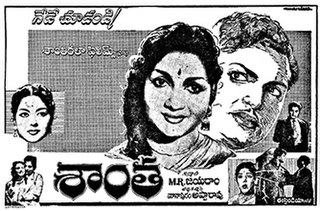
Santha is a 1961 Indian Telugu-language drama film, produced by M. R. Jayaram under the Santhikala Films banner and directed by Manapuram Appa Rao. It stars N. T. Rama Rao and Anjali Devi, with music composed by Ramesh Naidu.

Kalisochina Adrushtam is a 1968 Indian Telugu-language drama film, produced by M. Jagannatha Rao under the S.V.S. Films banner and directed by K. Viswanath. It stars N. T. Rama Rao, Kanchana and music composed by T. V. Raju.




















